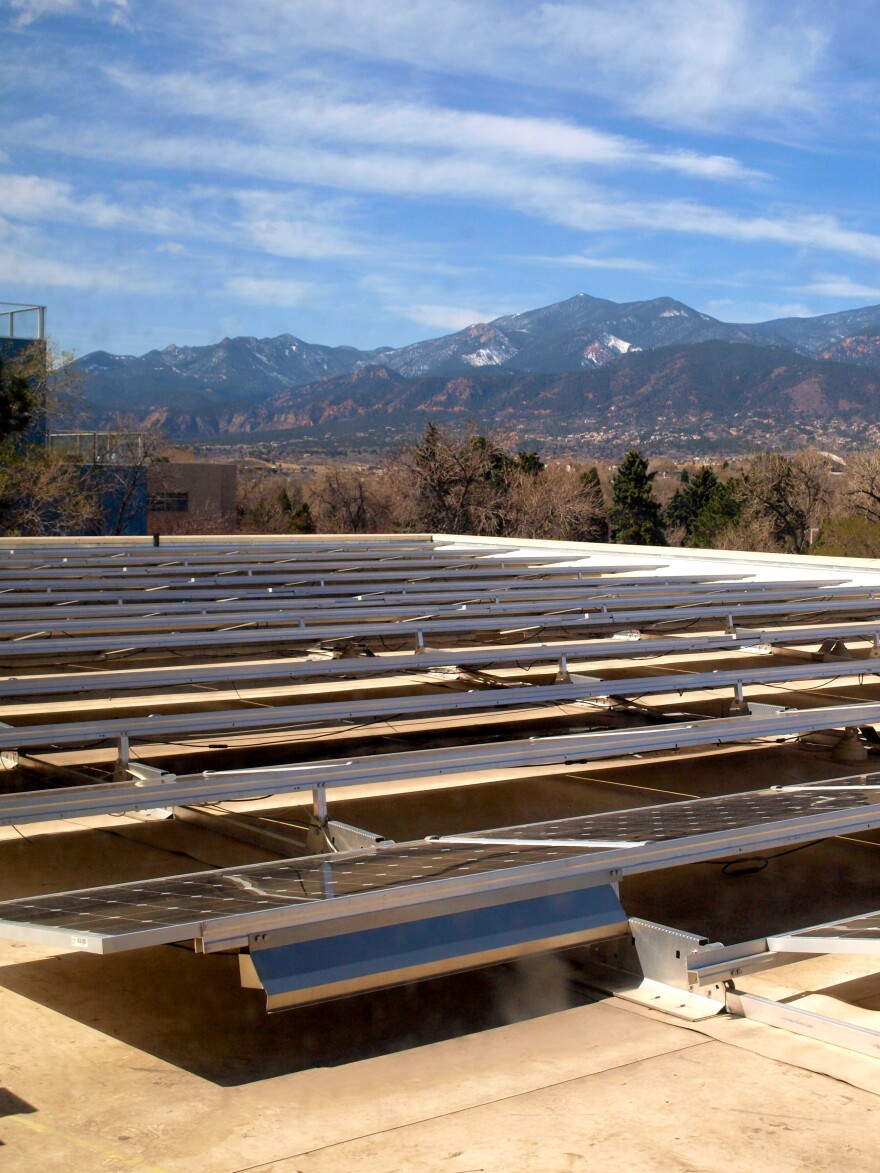Last week Colorado College, a private liberal arts college in Colorado Springs, announced that it had reached carbon neutrality. They say they are the first institution of higher education in the Rocky Mountain region to do so.
Ian Johnson, Colorado College’s director of sustainability, joined KUNC’s Colorado Edition to discuss how the college did it, and what work is left to be done.
Interview Highlights
These interview highlights have been lightly edited for length and clarity.

Erin O’Toole: For listeners who might not be familiar with the term, can you explain what carbon neutrality is?
Ian Johnson: The basic premise of it is that we’ve reduced our emissions to a large extent, greenhouse gas emissions on campus, and then for those that still remain, we’re working with some developers and investing in projects and technologies elsewhere that are removing greenhouse gas emissions from the atmosphere to the same extent that we still are emitting those.
And so that net neutrality — that net zero equation or accounting factor — adds up to zero on an annual basis.
What might be an example of carbon offsets?
There’s a lot of different types of projects out there. The easiest one that most people tend to understand is something like tree planting, planting forests and putting on an easement so those trees remain there well into the future.
Some of the projects that we’re actually working with are a little more involved. We’re working with a project up in Larimer County near Fort Collins on landfill gas destruction. So landfills emit methane, which is a potent greenhouse gas, and we’re working with them on a new project that takes that methane and converts it while producing power at the same time.
Interesting, you’re spreading all over the state with these efforts.
That’s something that’s been very important to us, our campus sustainability council has weighed in pretty heavily on that — that any of these solutions that we invest in, we want it to be as local as possible. That atmospherically across the world it has a global impact, but we really want to try to find things that have those co-benefits, either environmental or social benefits here closer to home, so really putting our efforts and our investment dollars towards local impacts.

Is it possible for the college to have no emissions at all? Is that a goal?
I think to actually get to zero emissions is not possible, it’s not something that’s technically feasible. Just by virtue of the fact that the soil on our campus is breathing the same as we are and there are emissions associated with that. We can get down to a very, very small amount, but right now the technology isn’t there.
We still need to use some fossil fuels to heat our campus, we’re still in a fossil fuel-based economy, so while we’re always looking for ways to reduce that, and helping to leverage whatever the next technologies are that are going to replace that, I think getting to absolute zero is something that’s not feasible in our current economy.

What work is left to do on campus there at Colorado College to make things more sustainable?
We’re certainly not done. This isn’t the end, this is just a milestone. As I mentioned earlier, emissions still remain despite the fact that we’ve reduced them.
And we continue working towards those, we’ve convened at this point a climate change task force that’s investigating what else we can impact, not only on our campus, but what can we do with our endowment to start to leverage some of those co-benefits that I talked about a little bit earlier, particularly in our local economy, how do we invest in things that not only have a financial return but are getting some other returns that we’re looking for, social and environmental benefits.
We’re really looking at how we can take this and use this to work with other institutions and become a model for this. We’re one of only 8 other institutions really in the world at this point that have done this, and so I think we’ve got some knowledge to share, and we’re really looking at ways we can help spread that knowledge and help build successes elsewhere out there.
This conversation is part of KUNC’s Colorado Edition for Jan. 27. You can listen to the full episode here.






